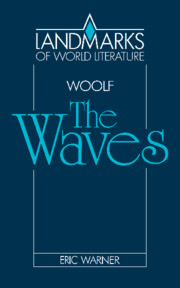Summary
The power of process
At one point, while deep in the struggle to compose The Waves, Woolf suggested that the work had ‘a large & potential theme’, which Orlando had lacked (28 Mar. 1930). This comment remains curiously close to the mark, even without a knowledge of her intentions. Every reader, however baffled or confused, must sense the presence of some large and meaningful ambition behind the strangeness of the work. Yet discovering precisely what that ‘theme’ is is not an easy task, since it tends to remain in the realm of ‘potential’ rather than emerging with any distinctness and clarity. This is partly due to the abstracting elements of the form; but it is also owing to the fact, as I indicated at the outset, that the book is replete with meaning – it is, in the current phrase, ‘overdetermined’. The highly conscious intelligence of the speakers presents the point of each perception the moment it is grasped, and this is multiplied in the book to the extent that an overall ‘meaning’ is obscured. We get a profusion of reports, a surfeit of eloquent comment at each stage from six different perspectives, with the result that there is a plethora of perceptions, implications and understandings, a multiplication of ‘potential’ meanings, which is confusing, contradictory and destructive of coherence. For all the abstract and strongly marked features of structure and form, our experience of reading The Waves is one of continuous metamorphosis and transformation – very like the waves, in fact.
- Type
- Chapter
- Information
- Virginia Woolf: The Waves , pp. 58 - 84Publisher: Cambridge University PressPrint publication year: 1986



